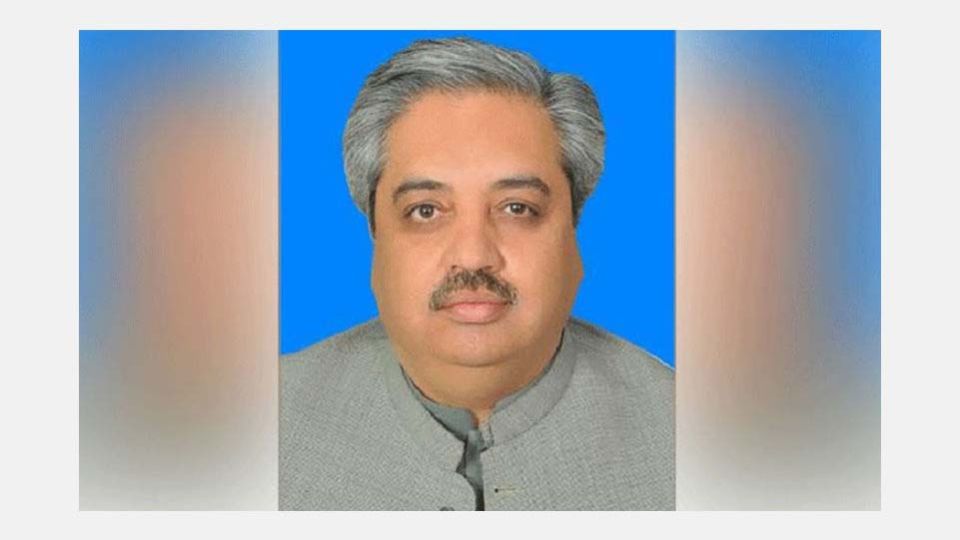July 4, 2024
BAJAUR – Former senator Hidayatullah Khan was killed, along with four others, on Wednesday in a blast from an improvised explosive device (IED) in Khyber Pakhtunkhwa’s Bajaur, officials said.
Malakand Regional Police Officer Muhammad Ali Khan Gandapur told Dawn.com that the former senator’s car was targeted in an IED attack in Bajaur’s Damadola area and four people were killed.
He added that no one had claimed responsibility for the attack as of yet.
Meanwhile, Dr Naseeb Gul, the medical superintendent of the District Headquarters Hospital Bajaur, told Dawn.com that five people were killed in the attack and their bodies were brought to the hospital.
Bajaur District Police Officer Sajjad Ahmad told Dawn.com that the bomb disposal unit was conducting its investigation and the situation would be made clearer after its report.
He added that the former senator was on the way to a by-election campaign in Damadola when he was attacked.
KP Chief Minister Ali Amin Gandapur condemned the incident and summoned a report from police authorities.
“All aspects of the incident should be investigated and a report should be submitted,” he was quoted as saying in a statement.
KP government spokesperson Barrister Mohammad Ali Saif offered prayers for the deceased and said: “Such cowardly attacks cannot dampen our spirits.”
A statement from President Asif Ali Zardari said he expressed regret over the deaths due to a “remote-controlled bomb”. He strongly condemned the attack and extended his condolences to the family members of the victims.
Prime Minister Shehbaz Sharif ordered the identification of those responsible for the terrorist incident leading to exemplary punishment.
While condemning the incident in the strongest words, the prime minister said that terrorist elements were the enemies of law and order and democracy, but could not deter the resolve of the Pakistani nation.
He also reiterated the resolve to eliminate the spectre of terrorism from the country.
Senate Chairman Yousuf Raza Gilani, Deputy Chairman Syedaal Khan, house leader Ishaq Dar and opposition leader Shibli Faraz also condemned the attack.
Interior Minister Mohsin Naqvi too strongly condemned the lives lost in the blast.
KP Chief Secretary Nadeem Aslam Chaudhry condemned the attack, saying that it was very unfortunate.
“We will not be discouraged by such cowardly attacks. The martyrdom of the former senator and others will not go in vain,” he said, extending his condolences to the relatives of the three.
“Ending the monster of terrorism should be the agreed agenda of all the democratic parties of the country,” PPP Chairman Bilawal Bhutto-Zardari said while responding to the attack.
“Senator Hidayatullah always highlighted the problems of former Fata in the House. Tribal areas have been deprived of a strong voice. The PPP stands in solidarity with the family members of senator Hidayatullah and we are with them in their demand for the end of terrorism and justice,” said PPP Senator Sherry Rehman.
Awami National Party (ANP) President Aimal Wali Khan also condemned the attack and criticised security agencies, asking if they would answer for the incident.
“Just a few days before the by-elections, such incidents are a question mark on security in Bajaur and a complete failure of the security agencies. ANP strongly condemns the cowardly attack and demands that the perpetrators and facilitators involved in the incident be strictly punished,” he said in a post on X.
Hidayatullah joined the PTI in 2018, a move which was resented by local party activists. His father was former MNA Haji Bismillah Khan while his elder brother was former KP governor Shaukatullah Khan.
According to the Senate website, he was an independent senator from March 2018 to March 2024.
In January, he had submitted a resolution in the Senate Secretariat, which stated that the upper house of Parliament had taken note of an increase in attacks targeting candidates.
The resolution had urged the Election Commission of Pakistan and the Supreme Court to delay general elections for three months due to security challenges.


